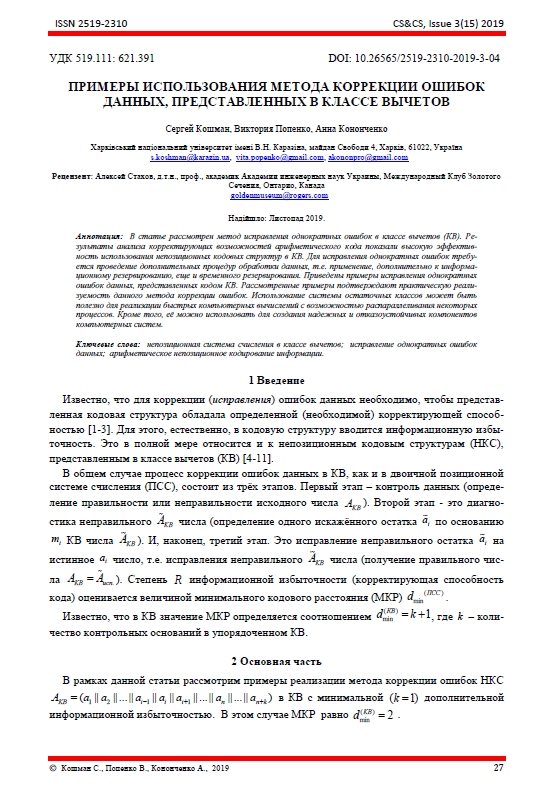Examples of usage of method of data errors correction which are presented by the residual classes
Abstract
The article discusses a method for correcting single errors in the residue class. The results of the analysis of the corrective capabilities of the arithmetic code showed the high efficiency of using non-position code structures in the class of residues. To correct single errors, additional data processing procedures are required, i.e. the use, in addition to the information reservation, also temporary reservation. Examples of correction of one-time data errors represented by code in the residue class are given. The considered examples confirm the practical feasibility of this error correction method. Using a system of residual classes can be useful for implementing fast computer calculations with the possibility of parallelizing some processes. In addition, it can be used to create reliable and fault-tolerant components of computer systems.
Downloads
References
F. MacWilliams, N. Sloane, The Theory of Error-Correcting Codes. Elsevier, 1977.
J. Proakis, Digital communications, McGraw Hill, 2001.
B. Sklar, Digital Communications: Fundamentals and Applications. Prentice Hall Communications Engineering and Emerging Techno, Pearson Education, 2016.
F. Barsi and P. Maestrini, "Error Correcting Properties of Redundant Residue Number Systems," in IEEE Transactions on Com-puters, vol. C-22, no.3, pp. 307-315, March 1973.
V.Krasnobayev, A.Kuznetsov, S.Koshman, S. Moroz, "Improved Method of Determining the Alternative Set of Numbers in Residue Number System", in Recent Developments in Data Science and Intelligent Analysis of Information. ICDSIAI 2018. Advances in Intelligent Systems and Computing, vol. 836. Springer, Cham, pp. 319-328, 05 August 2018. doi: 10.1007/978-3-319-97885-7_31.
Y. N. Kocherov, D. V. Samoylenko and A. I. Koldaev, "Development of an Antinoise Method of Data Sharing Based on the Application of a Two-Step-Up System of Residual Classes", 2018 International Multi-Conference on Industrial Engineering and Modern Technologies (FarEastCon), Vladivostok, pp. 1-5, 2018.
V. Krasnobayev, A. Kuznetsov, S. Koshman, S. Moroz, "Improved Method of Determining the Alternative Set of Numbers in Residue Number System", in Recent Developments in Data Science and Intelligent Analysis of Information. ICDSIAI 2018. Ad-vances in Intelligent Systems and Computing, vol. 836. Springer, Cham, pp. 319-328, 05 August 2018. doi: 10.1007/978-3-319-97885-7_31.
M. Kasianchuk, I. Yakymenko, I. Pazdriy, A. Melnyk and S. Ivasiev, "Rabin's modified method of encryption using various forms of system of residual classes", 14th International Conference The Experience of Designing and Application of CAD Systems in Microelectronics (CADSM), Lviv, 2017, pp. 222-224. doi: 10.1109/CADSM.2017.7916120.
V. Krasnobayev, A. Kuznetsov, A. Kononchenko, T. Kuznetsova, "Method of data control in the residue classes", in Proceedings of the Second International Workshop on Computer Modeling and Intelligent Systems (CMIS-2019), Zaporizhzhia, Ukraine, April 15-19, 2019, pp. 241-252.
M. Karpinski, S. Ivasiev, I. Yakymenko, M. Kasianchuk and T. Gancarczyk, "Advanced method of factorization of multi-bit numbers based on Fermat's theorem in the system of residual classes", 16th International Conference on Control, Automation and Systems (ICCAS), Gyeongju, 2016, pp. 1484-1486.
V. Krasnobayev, A. Kuznetsov, I. Lokotkova and A. Dyachenko, "The Method of Single Errors Correction in the Residue Class", 3rd International Conference on Advanced Information and Communications Technologies (AICT), Lviv, Ukraine, 2019, pp. 125-128. doi: 10.1109/AIACT.2019.8847845.
V. Krasnobayev, A. Kuznetsov, M. Zub, K. Kuznetsova, "Methods for comparing numbers in non-positional notation of residual classes", in Proceedings of the Second International Workshop on Computer Modeling and Intelligent Systems (CMIS-2019), Zaporizhzhia, Ukraine, April 15-19, 2019., pp. 581-595.
V. Krasnobaev, A. Kuznetsov, V. Babenko, M. Denysenko, M. Zub and V. Hryhorenko, "The Method of Raising Numbers, Represented in the System of Residual Classes to an Arbitrary Power of a Natural Number", IEEE 2nd Ukraine Conference on Electrical and Computer Engineering (UKRCON), Lviv, Ukraine, 2019, pp. 1133-1138. doi: 10.1109/UKRCON.2019.8879793
K. Tao, L. Peng, K. Liang and B. Zhuo, "Irregular repeat accumulate low-density parity-check codes based on residue class pair", IEEE 9th International Conference on Communication Software and Networks (ICCSN), Guangzhou, 2017, pp. 127-131. doi: 10.1109/ICCSN.2017.8230092.
G. Harman and I. E. Shparlinski, "Products of Small Integers in Residue Classes and Additive Properties of Fermat Quotients", in International Mathematics Research Notices, vol. 2016, no. 5, pp. 1424-1446, Jan. 2016. doi: 10.1093/imrn/rnv182.
C. Fan and G. Ge, "A Unified Approach to Whiteman's and Ding-Helleseth's Generalized Cyclotomy Over Residue Class Rings", in IEEE Transactions on Information Theory, vol. 60, no. 2, pp. 1326-1336, Feb. 2014. doi: 10.1109/TIT.2013.2290694.
A.Wang, A. Zhang and Sh. Chen, "Study On simulation and design of data links human computer interface," International Con-ference on Computer Science and Service System (CSSS), Nanjing, 2011, pp. 4066-4069.
doi: 10.1109/CSSS.2011.5974893.
S. Irfan and S. Ghosh, "Optimization of information retrieval using evolutionary computation: A survey", International Confer-ence on Computing, Communication and Automation (ICCCA), Greater Noida, 2017, pp. 328-333.
doi: 10.1109/CCAA.2017.8229837.
S. Shu, Y. Wang and Y. Wang, "A research of architecture-based reliability with fault propagation for software-intensive sys-tems", Annual Reliability and Maintainability Symposium (RAMS), Tucson, AZ, 2016, pp. 1-6.
S. S. Gokhale, M. R. Lyu and K. S. Trivedi, "Reliability simulation of component-based software systems", Proceedings Ninth International Symposium on Software Reliability Engineering (Cat. No.98TB100257), Paderborn, Germany, 1998, pp. 192-201.
Tiwari, K. Tomko, "Enhanced Reliability of Finite State Machines in FPGA Through Efficient Fault Detection and Correction", IEEE Transaction on Reliability, vol. 54, no. 3, pp. 459-467.
Singh and A. Sprintson, "Reliability assurance of cyber-physical power systems", IEEE PES General Meeting, Providence, RI, 2010, pp. 1-6.
M. Reddy and N. Nalini, "FT2R2Cloud: Fault tolerance using time-out and retransmission of requests for cloud applications", International Conference on Advances in Electronics Computers and Communications, Bangalore, 2014, pp. 1-4.
Braun and H. Wunderlich, "Algorithm-based fault tolerance for many-core architectures", 15th IEEE European Test Symposium, Praha, 2010, pp. 253-253.
M. Radu, "Reliability and fault tolerance analysis of FPGA platforms", IEEE Long Island Systems, Applications and Technology (LISAT) Conference 2014, Farmingdale, NY, 2014, pp. 1-4.


